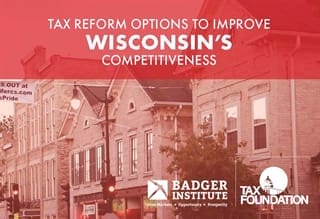A new report from the Tax Foundation and the Badger Institute offers five comprehensive tax reform options to enhance Wisconsin’s tax competitiveness by reducing harmful taxes on labor and investment.
Over the past two years, a wave of tax reform has swept the country, with a historic number of states enacting laws to improve tax competitiveness. In 2021, Wisconsin was among 13 states to enact laws reducing individual or corporate income tax rates, and as of this writing, 11 states have enacted legislation in 2022 to reduce income tax rates. Six of these tax-cutting states sit within a 200-mile radius of Wisconsin, creating an intensely competitive regional tax environment.
In 2019, 2020, and 2021, Wisconsin reduced its second-highest individual income tax rate once and its lowest two rates twice, targeting tax relief toward low- and middle-income taxpayers. But Wisconsin’s top marginal individual income tax rate—which applies to approximately two-thirds of pass-through business income—has been left unchanged for a decade, and the state income tax landscape has grown dramatically more competitive during that time. In fact, 25 states have lower top marginal individual income tax rates now than they did in 2012. As of 2023, when Iowa’s top rate drops to 6 percent (with further reductions to 3.9 percent), Minnesota and Wisconsin will be left with the highest top marginal individual income tax rates of all the non-coastal states stretching from California to New York.
Adding to the urgency of reform, the COVID-19 pandemic quickly accelerated a trend toward more flexible workplace arrangements, and many workers now find themselves free to live in a state of their choosing while working for an employer in another. With enhanced workplace flexibility and with inflation at its highest level in four decades, many people are leaving high-tax, high cost-of-living jurisdictions in favor of states with lower costs of living, including lower taxes—specifically, states with low or no income taxes.
Individuals and businesses weigh many factors when deciding where to locate or invest—such as family and weather, as well as infrastructure, quality of life, and a suitable workforce. Not many of these factors are within policymakers’ control, and, even when they are, economic growth generated from educational improvements or infrastructure investments, for example, may take years to manifest. But tax policy is within policymakers’ control, and policy changes can yield real economic results much more quickly.
Even with the improvements Wisconsin has made since 2019, the state is quickly falling behind on income tax competitiveness, and this has implications both for business investment and for Wisconsin’s ability to attract and retain a highly skilled workforce.
This publication presents five sample comprehensive tax reform options for Wisconsin and explains how each of the proposed policy changes would help Wisconsin become more economically competitive. Several components of these sample tax reform options are similar to the components of the reform options that were presented in our 2019 publication Wisconsin Tax Options: A Guide to Fair, Simple, Pro-Growth Reform, but these new options reflect current tax collections and revenue forecasts, as well as recent tax policy changes in Wisconsin.





